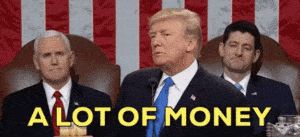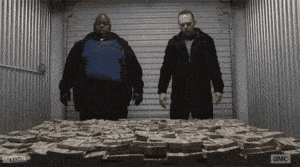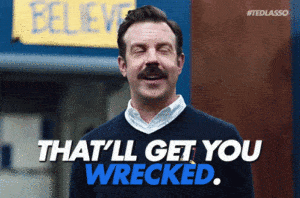A few months ago, someone placed an online wager of $7.16 at FanDuel Sportsbook. The bet was a 25-leg parlay of college football games all happening on the same Saturday. A parlay combines multiple bets together and if one of them fails then you lose the entire bet. So this bettor picked the outcome of 25 college football games, and if only one of the picks was wrong, the bet would be lost.
However, if all the picks were correct, the bet would payout $1.016 million.

I imagine the bettor wasn’t meticulously watching each and every game from the outset since the wager amount was so small and the odds of winning a bet like this are slim. Although, as the games began Saturday morning and went on throughout the day, I assume this person’s attention gradually grew as one by one each of the picks was turning out to be correct.
By the time evening rolled around, the bettor had won 23 of the 25 legs of the parlay—only two games remained that night.
On betting apps, after each game is over you’re given the option of cashing out the bet before it’s completed. If you ever watched the show Deal or No Deal, it’s equivalent to the Banker’s offer.
Before the two final games, the bettor had the option to cash out the bet for $252,000 or let it ride.
What a decision. Do you take the guaranteed $252,000 or let it play out for a chance at either $1 million or $0?
The anonymous bettor decided to take the cash before the last two games were over, turning a $7.16 bet into $252,000. An incredible feat that you rarely, if ever, see happen.

Now, I don’t share this story to advocate for sports betting as a wealth-building strategy. Nor do I want to compare long-term investing to gambling, which should be handled quite the opposite. I share it because I think it’s a good story about knowing how much is “enough.”
As it turned out, the outcomes of the final two games went as the bettor predicted. They correctly picked all 25 games that Saturday. Had the bettor just held on to the end, they would have earned a payout of $1.016 million. More than quadruple the amount that was cashed out.
FanDuel Sportsbook actually reached out to the person after they cashed out to ask how they felt about missing out on $1 million. This was the response:
“Having the million would be so nice, but honestly turning $7.16 into $252k is good enough for me. Just knowing that if one of those bets didn’t hit and I’d lose the chance to change my life would’ve made me SICK.”
I thought that was a great answer.
Warren Buffet echoes this gambler’s sentiment in one of my favorite quotes:
“Never risk what you have for something you don’t need.”

One of the most important financial skills is getting the proverbial goalpost to stop moving. It’s also one of the hardest. In a game that can’t be won, you have to define what winning means for you.
Walt Disney’s granddaughter, Abigail Disney, discussed this in an interview a few years ago:
“They did a study at the Chronicle of Philanthropy years ago where they asked people who inherited money, ‘What amount of money would you need to feel totally secure?’ And every single one of them, no matter what they had, named a number that was roughly twice what they inherited. So that’s what you need to know about money, right? If that is your primary measure of success or value in life, then good luck with that, because it will never feel good.”
On one hand, it’s a good thing to be driven to improve your place in life. This drive to get better is what fuels innovation, growth, and progress. But those same attributes can drive you mad if you never feel satisfied with your accomplishments.
“Making as much money as possible” is not a financial plan and an attitude that usually leads to regret.
I think it’s important to note that managing expectations around money doesn’t mean you’re unambitious. It’s just realizing that an insatiable appetite for more will always push you to the point of disappointment. Having some ability to deny an extra dollar from work, or a potential investment opportunity, a bigger house, or a nicer car, is a crucial financial skill for a better life.
I like this analogy from Morgan Housel:
“Money buys happiness in the same way drugs bring pleasure: Incredible if done right, dangerous if used to mask a weakness, and disastrous when no amount is ever enough.”
Thanks for reading!

